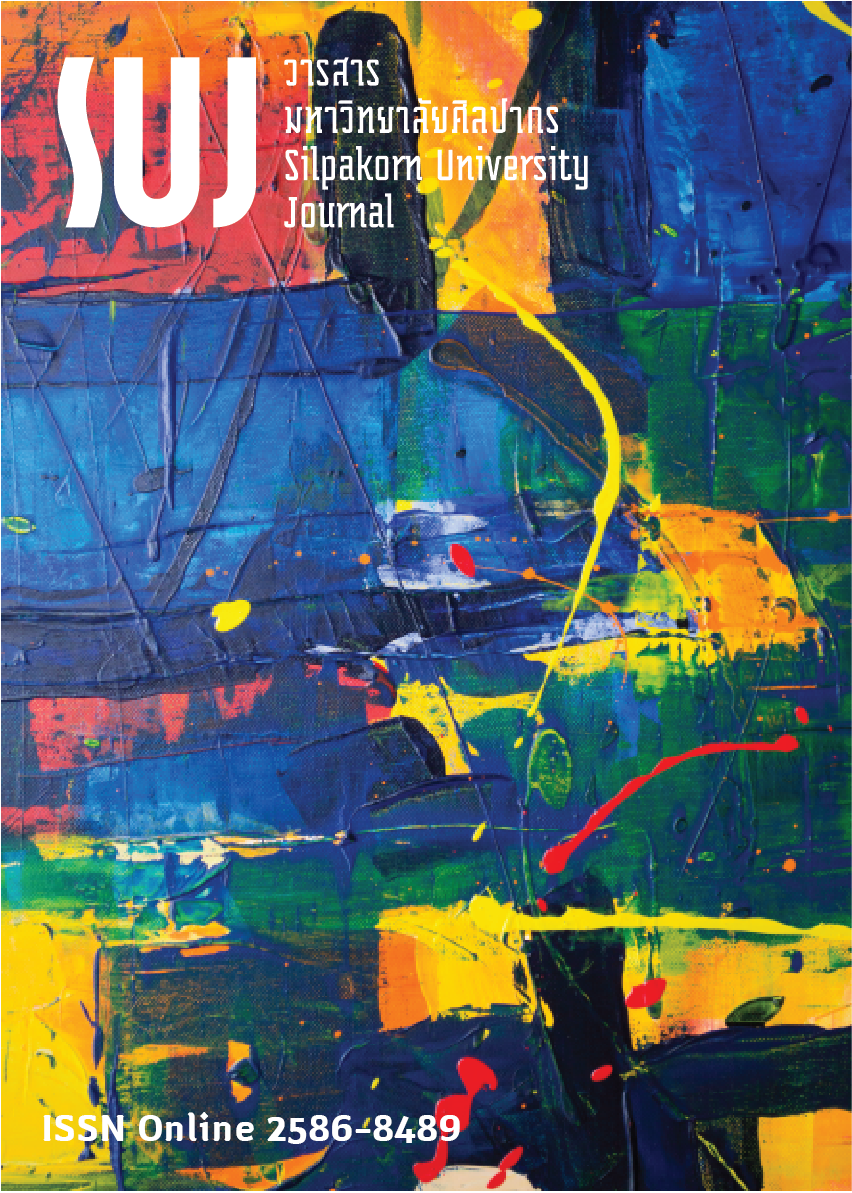ภาวะผู้นำการเปลี่ยนแปลงของผู้บริหารสถานศึกษาที่ส่งผลต่อการเป็นองค์การแห่งการเรียนรู้ของสถานศึกษาขั้นพื้นฐานในสังกัดสำนักงานเขตพื้นที่การศึกษามัธยมศึกษา เขต 7 (Transformational leadership of school administrators affecting the being of learning organization in basic education schools under the Secondary Education Service Area Office 7)
Main Article Content
Abstract
การวิจัยครั้งนี้มีวัตถุประสงค์เพื่อศึกษา 1) ระดับภาวะผู้นำการเปลี่ยนแปลงของผู้บริหารสถานศึกษา และระดับการเป็นองค์การแห่งการเรียนรู้ของสถานศึกษาขั้นพื้นฐาน 2) ความสัมพันธ์ระหว่างภาวะผู้นำการเปลี่ยนแปลงของผู้บริหารสถานศึกษา กับการเป็นองค์การแห่งการเรียนรู้ของสถานศึกษาขั้นพื้นฐาน และ 3) อิทธิพลของภาวะผู้นำการเปลี่ยนแปลงของผู้บริหารสถานศึกษาที่มีต่อการเป็นองค์การแห่งการเรียนรู้ของสถานศึกษาขั้นพื้นฐานสังกัดสำนักงานเขตพื้นที่การศึกษามัธยมศึกษา เขต 7 กลุ่มตัวอย่างเป็นโรงเรียนในสังกัดสำนักงานเขตพื้นที่การศึกษามัธยมศึกษา เขต 7 จำนวน 41 แห่ง โดยมีครูหัวหน้าระดับในแต่ละโรงเรียนเป็นผู้ให้ข้อมูล ระดับชั้นละ 1 คน เครื่องมือที่ใช้เป็นแบบสอบถามแบบมาตรประมาณค่าโดยแบบสอบถามเกี่ยวกับภาวะผู้นำการเปลี่ยนแปลงใช้แนวคิดของ Bass และ Avolio และสำหรับแบบสอบถามเกี่ยวกับการเป็นองค์การแห่งการเรียนรู้ ใช้แนวคิดของ Senge สถิติที่ใช้ในการวิเคราะห์ข้อมูล ได้แก่ ความถี่ ค่าร้อยละ ค่าเฉลี่ย ส่วนเบี่ยงเบนมาตรฐาน สัมประสิทธิ์สหสัมพันธ์ของเพียร์สันและการวิเคราะห์ถดถอยเชิงพหุแบบขั้นตอน ผลการวิจัยพบว่า 1) ระดับภาวะผู้นำการเปลี่ยนแปลงของผู้บริหารสถานศึกษา ในภาพรวมอยู่ในระดับมาก ด้านที่มีค่าเฉลี่ยสูงสุด คือ ด้านการมีอิทธิพลอย่างมีอุดมการณ์ ส่วนด้านที่มีค่าเฉลี่ยต่ำสุด คือ ด้านการคำนึงถึงความเป็นปัจเจกบุคคล และระดับการเป็นองค์การแห่งการเรียนรู้ของสถานศึกษา ในภาพรวมอยู่ในระดับมาก ด้านที่มีค่าเฉลี่ยสูงสุด คือ ด้านการมีวิสัยทัศน์ร่วม ส่วนด้านที่มีค่าเฉลี่ยต่ำสุด คือ ด้านการเป็นบุคคลที่รอบรู้ 2) ภาวะผู้นำการเปลี่ยนแปลงของผู้บริหารสถานศึกษากับการเป็นองค์การแห่งการเรียนรู้ของสถานศึกษา มีความสัมพันธ์ทางบวกในระดับสูงที่ระดับนัยสำคัญ .01 และ 3) ผลการวิเคราะห์อิทธิพลของภาวะผู้นำการเปลี่ยนแปลงของผู้บริหารสถานศึกษาที่มีต่อการเป็นองค์การแห่งการเรียนรู้ของสถานศึกษา พบว่า ภาวะผู้นำการเปลี่ยนแปลง มีอิทธิพลต่อการเป็นองค์การแห่งการเรียนรู้ของสถานศึกษาขั้นพื้นฐานสังกัดสำนักงานเขตพื้นที่การศึกษามัธยมศึกษา เขต 7 อย่างมีนัยสำคัญทางสถิติที่ระดับ .05 โดยสามารถพยากรณ์การเป็นองค์การแห่งการเรียนรู้ของสถานศึกษาได้ร้อยละ 72.0
The purposes of this research were to study: 1) the level of transformational leadership of school administrators and the level of being of learning organization in basic education schools; 2) the relationships between transformational leadership of school administrators and the being of learning organization in basic education schools; and 3) the influence of transformational leadership of school administrators on the being of learning organization in basic education schools under the Secondary Educational Service Area Office 7. The research sample consisted of 41 basic education schools under the Secondary Educational Service Area Office 7. The research informants were teachers who were class level heads in each school. The employed research instrument was a rating scale questionnaire. The questionnaire regarding transformational leadership uses the concepts of Bass & Avolio, and the questionnaire about being a learning organization uses Senge's concepts. Statistics employed for data analysis were the frequency, percentage, mean, standard deviation, correlation coefficient, and stepwise multiple regression analysis. Research findings were as follow: 1) the overall transformational leadership of school administrators was at the high level, with the aspect receiving the top rating mean being that of having the idealized influence; whereas the aspect receiving the lowest rating mean being that of consideration for individuals; on the other hand, the overall being of learning organization of the basic education schools was at the high level, with the aspect receiving the top rating mean being that of having the shared vision; whereas the aspect receiving the lowest rating mean being that of being the person with mastery learning; 2) transformational leadership of school administrators correlated positively and significantly at the .01 level with learning organization of the basic education schools; and 3) the influence of transformational leadership of school administrators on the being of learning organization of the basic education schools showed that transformational leadership of school administrators had significant influence on the being of learning organization of basic education schools under the Secondary Educational Service Area Office 7 at the .05 level; and transformational leadership of school administrators could predict learning organization of the schools by 72.0 percent.
Downloads
Article Details
References
Bass, B. M. (1990). From Transactional to Transformational Leadership: Learning to Share the Vision. Organizational Dynamics, 18(3): 19-31.
Bass, B. M. & Avolio, B. J. (1994). Improving organizational effectiveness through Transformational Leadership. London: Sage.
Collins, B. J. (2016). A High School as a Learning Organization: The Role of the School LeadershipTeam in Fostering Organizational Learning. Doctoral dissertation, George Washington University, Washington, D.C., United States.
Halpin, A. W. (1966). Theory and Research in Administration. New York: Macmillan.
Japimai, Sasitorn. (2013). A Study of the School Adminstrators Transformational Leadership Effect to the Learning Oganization by Teacher under the Office of Nakhonratchasima Primary Education Service Area 4 (การศึกษาภาวะผู้นำการเปลี่ยนแปลงของผู้บริหารสถานศึกษาที่ส่งผลต่อความเป็นองค์การแห่งการเรียนรู้ตามทัศนะคติของครูผู้สอน สังกัดสำนักงานเขต
พื้นที่การศึกษาประถมศึกษา นครราชสีมา เขต 4). Master’s dissertation, Nakhon Ratchasima Rajabhat University, Nakhon Ratchasima, Thailand.
Krejcie, R. V. & Morgan, D. W. (1970). Determining Sample Size for Research Activities. Educational and Psychological Measurement, 30(3): 607-610.
Marquardt, M. J. (1997). 16 Steps to Becoming a Learning Organization. United State of America: ASTD Press.
Ministry of Education. (2007). Development of Transformational Leadership for Underlie the Decentralization (การพัฒนาผู้นำการเปลี่ยนแปลงเพื่อรองรับการกระจายอำนาจ). Nakhon Pathom: National Institute for Development of Teachers, Faculty Staff and Educational Personnel.
Muakthaisong, Pipatpong. (2016). The Relationship Transformational Leadership of Administrators and Learning Organization of Schools Under Buriram Primary Educational Service Area Office 4 (การศึกษาความสัมพันธ์ระหว่างภาวะผู้นำการเปลี่ยนแปลงของผู้บริหารสถานศึกษากับการเป็นองค์กรแห่งการเรียนรู้ของโรงเรียนในสังกัดสำนักงานเขตพื้นที่การศึกษาประถมศึกษาบุรีรัมย์ เขต 4). Master’s dissertation, Buriram Rajabhat University, Buriram, Thailand.
Namson, Nittaya. (2013). The Relationship Transformational Leadership of Administrators and Learning Organization of Schools Under Lop-Buri Primary Educational Service Area Office 2 (การศึกษาความสัมพันธ์ระหว่างภาวะผู้นำการเปลี่ยนแปลงของผู้บริหารสถานศึกษากับการเป็นองค์การแห่งการเรียนรู้ของสถานศึกษาในสังกัดสำนักงานเขตพื้นที่การศึกษาประถมศึกษาลพบุรี เขต 2). Master’s dissertation, Mahasarakham University, Mahasarakham, Thailand.
Noknoy, Jessada., et al. (2009). The viewpointsof Knowledge Menagement and building a learning organization (นานาทรรศนะการจัดการความรู้ และการสร้างองค์การแห่งการเรียนรู้). Bangkok: S. Asia Press.
Office of the National Economic and Social Development. (2016). The Twelfth National Economic and Social Development Plan 2017-2021 (แผนพัฒนาเศรษฐกิจและสังคมแห่งชาติฉบับที่สิบสอง พ.ศ. 2560 - 2564). Bangkok: Office of the National Economic and Social Development.
Senge, P. M. (1990). The fifth discline: The art practice of the learning organization. New York: Doubleday.
Senge, P. M. (1994). The fifth discline fieldbook: Strategies and tools for building a learning organization. London: Nicholas Brealey.


